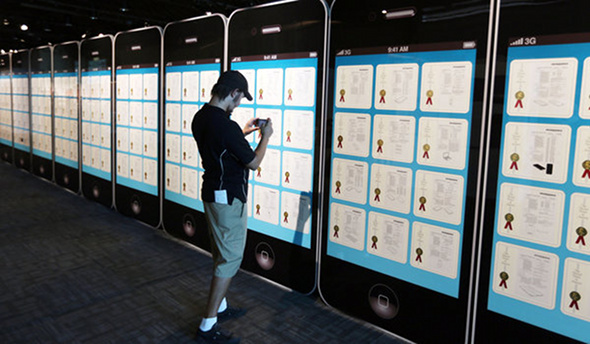How Much Have the Patent Wars Cost? $20 Billion in the Last Two Years
Here’s your number of the day: $20 billion. That’s how much cash was crapped away on patent lawsuits and litigation over the last two years--just in the smartphone industry, according to the New York Times.
Even more sad is that for the first time, Google and Apple spent more last year on patent lawsuits and acquisitions meant to shore up or protect patent portfolios than on R&D.
The patent wars have become absurd. From the ticky-tacky ruling on Apple v. Samsung to any number of smaller companies getting drowned by litigation costs or hamstrung by a system gone awry, the patent system--which, to be fair, works well for some industries--simply does not work for the computing industry. In any case, the broken system is at best muddying the waters enough that plenty of brilliant players are staying out of the game and at worst flat-out killing innovation.

A wall of Apple patents (Image credit: NYT)
That’s not to say that patents are useless; sometimes you have to bring out the lawyers in order to protect your business if someone is stealing or copying your ideas. However, a system designed as a defense against crooks has turned into an offensive weapon used to vanquish opponents.
To use a football analogy, the old way to innovate and succeed in a market was like playing better to beat the other team--block better, complete more passes, figure out how to stymie the offense with a smothering defense, and so on. The way these patents wars have unfolded, it’s like winning the game by taking out the other teams’ quarterback with a brutal headshot and kneecapping the star running back.

U.S. Patent Office, as busy as ever (Image credit: NYT)
Further, when dollars are funneled to the courts instead of R&D, consumers not only lose out on better products, they end up paying a de facto patent tax.
Look, a company like Google will never stop trying out new things and letting its employees’ ideas drive new products and innovations; the problem is that the little guys--say, the Steves Jobs and Wozniak ca. 1976, which is incredibly ironic--may never see their brilliant projects and companies to fruition and maturity, which hurts them, consumers, and the industry as a whole.
Even more sad is that for the first time, Google and Apple spent more last year on patent lawsuits and acquisitions meant to shore up or protect patent portfolios than on R&D.
The patent wars have become absurd. From the ticky-tacky ruling on Apple v. Samsung to any number of smaller companies getting drowned by litigation costs or hamstrung by a system gone awry, the patent system--which, to be fair, works well for some industries--simply does not work for the computing industry. In any case, the broken system is at best muddying the waters enough that plenty of brilliant players are staying out of the game and at worst flat-out killing innovation.

A wall of Apple patents (Image credit: NYT)
That’s not to say that patents are useless; sometimes you have to bring out the lawyers in order to protect your business if someone is stealing or copying your ideas. However, a system designed as a defense against crooks has turned into an offensive weapon used to vanquish opponents.
To use a football analogy, the old way to innovate and succeed in a market was like playing better to beat the other team--block better, complete more passes, figure out how to stymie the offense with a smothering defense, and so on. The way these patents wars have unfolded, it’s like winning the game by taking out the other teams’ quarterback with a brutal headshot and kneecapping the star running back.

U.S. Patent Office, as busy as ever (Image credit: NYT)
Further, when dollars are funneled to the courts instead of R&D, consumers not only lose out on better products, they end up paying a de facto patent tax.
Look, a company like Google will never stop trying out new things and letting its employees’ ideas drive new products and innovations; the problem is that the little guys--say, the Steves Jobs and Wozniak ca. 1976, which is incredibly ironic--may never see their brilliant projects and companies to fruition and maturity, which hurts them, consumers, and the industry as a whole.

